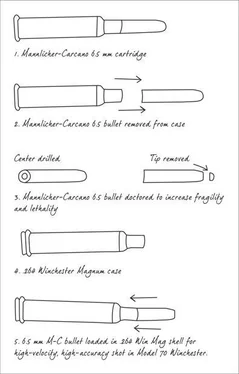Stephen Hunter - The Third Bullet
Здесь есть возможность читать онлайн «Stephen Hunter - The Third Bullet» весь текст электронной книги совершенно бесплатно (целиком полную версию без сокращений). В некоторых случаях можно слушать аудио, скачать через торрент в формате fb2 и присутствует краткое содержание. Жанр: Триллер, на английском языке. Описание произведения, (предисловие) а так же отзывы посетителей доступны на портале библиотеки ЛибКат.
- Название:The Third Bullet
- Автор:
- Жанр:
- Год:неизвестен
- ISBN:нет данных
- Рейтинг книги:5 / 5. Голосов: 1
-
Избранное:Добавить в избранное
- Отзывы:
-
Ваша оценка:
- 100
- 1
- 2
- 3
- 4
- 5
The Third Bullet: краткое содержание, описание и аннотация
Предлагаем к чтению аннотацию, описание, краткое содержание или предисловие (зависит от того, что написал сам автор книги «The Third Bullet»). Если вы не нашли необходимую информацию о книге — напишите в комментариях, мы постараемся отыскать её.
The Third Bullet — читать онлайн бесплатно полную книгу (весь текст) целиком
Ниже представлен текст книги, разбитый по страницам. Система сохранения места последней прочитанной страницы, позволяет с удобством читать онлайн бесплатно книгу «The Third Bullet», без необходимости каждый раз заново искать на чём Вы остановились. Поставьте закладку, и сможете в любой момент перейти на страницу, на которой закончили чтение.
Интервал:
Закладка:
Alek heads back down Beckley in the direction he’s come, diverts at Crawford to take a diagonal going nowhere, turns down Tenth, again seemingly arbitrarily, reaches the intersection of Patton and Tenth, and notices in horror that a black Dallas police car has just pulled over. The officer beckons him.
Now comes the tragedy of Officer Tippit. Had I known that the monster I created was capable of such violence, I would have put a .45 into him and walked away. That said, I must also say that I should have put a .45 into my own head as punishment for the mayhem that was about to transpire, which was entirely my own invention. What is the point of claiming responsibility if you don’t act on it? There is no point. I tried to use my sin as a motive for redemption and, over the years, gave my life in toto to Agency and country, knowing that I hadn’t the guts to punish myself as I should be punished. Perhaps my punishment lies ahead.
Poor Tippit. By accounts no genius, but a decent ex-GI who loved his job and did it well, content to be a patrolman forever, he was on the cusp of the biggest bust of the century when it all went bad on him. Moved from a farther patrol area into Oak Cliff as a precautionary measure and to stand by for orders, he had been alerted three times on his radio of the age, weight, height, and hair color of the suspect. He spies such a man walking down Tenth Street in Oak Cliff. Who knows what other tells Alek the idiot was broadcasting: walking too fast with his face screwed up in anguish, almost running, radiating the don’t-tread-on-me animosity that was his stock in trade, refusing eye contact while looking cautiously over his shoulder now and then. It could have been any or all of them.
No identification of Alek by name has yet been given over the radio, and none has linked him to Oak Cliff and the Beckley Avenue area. It’s just that his appearance is so right. That’s why Tippit tails him for a block or two and then pulls over. Yeats: “It’s old and it’s sad and it’s sad and it’s feary.” Yes, it was, especially “feary,” that is, fearful, horrifying, tragic. Had I but known. But I didn’t. Guilty, guilty, guilty.
Alek sees the black vehicle slow up and pull over. He realizes he’s been nabbed. He ambles off the sidewalk to the vehicle, where the officer, window rolled down, awaits him.
What could they have said? It’s pointless to imagine, and it was probably a banality, a cliche, nothing memorable. Witnesses – there were several, some close – report no hostility, no harsh words, no threats; it wasn’t an altercation, it was an exchange, and Alek may have gotten away with it for a second, for then he broke contact with the seated officer and turned to go on his way.
Tippit isn’t done with him but at the same time hasn’t made up his mind to make the pinch. He climbs from his squad car, gun definitely not in hand, and possibly calls to Alek.
Alek turns, walks around the car to place himself in range, draws, and fires three times point-blank. All three hits from close range are solid mortal blows, careening through center mass, upper body, blood-bearing organs, and as soon as he is hit, Tippit is down, bleeding out if not already dead.
Why?
After all, Alek is not without his verbal faculties; he’s a debater, an arguer from way back, a guy who’s always got an answer. That’s how he defines himself, part guerrilla warrior, part dialectical soldier. Why doesn’t he at least try to con his way out? The performance isn’t beyond him, and his intellectual vanity that he’s smarter than some cop would surely be in play.
From Alek’s point of view, the fact that the cop is already there – it’s only forty-five minutes after the shooting, and chaos and confusion reign – is proof that the man is part of the conspiracy. Whoever set Alek up either informed the authorities of his address or hired a professional killer dressed as a cop to ambush him when he returned home. Perhaps Dallas is full of professional killers in search of Alek, already equipped with his name, address, description, and likely whereabouts. That would be an easy intellectual leap for a man with Alek’s tendencies toward paranoia and conspiracy.
So Alek thinks the cop is a hit man. His rage, his paranoia, his violent nature, his fear, his self-hatred, and his other hatred were in full bloom in that single instant, and that and that alone can explain his next move, which utterly violates any principle of self-preservation.
If Alek has just shot a cop to escape, his next move has to be to turn and flee, race down alleyways, cut across yards, throw off any followers, catch a bus, get out of the area, fast.
Instead, he walks over to the downed Tippit and shoots him in the temple. From the autopsy: “[The bullet] is found to enter the right temporal lobe, coursed through the brain transecting the brain stem, severing the cerebral peduncles surrounded by extensive hemorrhage and found to exit from the brain substance in the calcarine gyrus to the left of the midline.” Of course he wasn’t shooting Officer Tippit; he was shooting me.
His vengeance expressed, Alek mutters, “Poor damn cop,” as he empties the shells from his cylinder and quickly reloads, then turns and heads up Patton, down Jefferson, cuts through a yard and dumps his jacket, then cuts back to Jefferson, which, in a half mile or so, will take him to the Texas Theatre. His absurd incompetence comes to the fore again. So lame is his attempt at escape and so ignorant is he of what’s going on around him, he is followed by a number of citizens. One of them has called the murder in to headquarters on Tippit’s radio. Two men snatch up Tippit’s revolver and begin to hunt Alek on their own.
In a brief while, a matter of several blocks down Jefferson, trailing trackers, Alek comes to a small commercial district. He’s consumed with evading his killers (even though he hasn’t bothered to look behind him), and his main thought is to get off the street. To the logic of his twisted brain, he seeks refuge by dodging into the Texas Theatre on that street. I suppose he thinks his killers will eventually be driven off the streets by the excess of Dallas policemen who will flood the zone in hours if not minutes. Perhaps he imagines a surrender, the revelation that the “cop” was a Mafia hit man, and some sort of redemption as he proves he never killed the president and he was manipulated by shadowy “others” of indeterminate origin. He might see himself as a hero, the subject of an admiring movie. In those ten minutes in the movie theater’s private darkness, he must have comforted himself by self-delusion. Facing the reality, for a man whose resources were so fragile, would have been too much.
And then the lights came on. His vacation had lasted ten minutes, and cops were closing in from both sides.
I first heard the name sometime in ’74 or ’75. I was in Moscow, working undercover in one of several well-documented Soviet identities. I was in and out of Moscow in those years under a variety of guises, and I have to say they were great years, maybe the best of my life. We knew we were getting somewhere and doing some good, and the economics and the demographics were breaking in our direction, so we were filled with hope and optimism. Moreover, Vietnam was managing to wind down without killing me or any of my sons, for which I was eternally grateful.
We were under pressure from Langley – or from the Defense Department by way of Langley – to come up with a gun. It was a new Soviet-issue semi-auto sniper rifle that bore the seemingly but not actually melodramatic name of Dragunov. It sounded like the SovMil had gotten all Hollywoody and called the thing the Dragon. No such luck. Soviet military nomenclature has always featured the name of the designer, which is why Sergeant Kalashnikov became world-famous, as did, in an earlier age, Comrade Tokarev, whose stubby little pistol snuffed out so many lives in the cellars of Lubyanka during the Great Purges of the thirties. In any event, although it seemed absurd in a world where giant rockets carrying nukes could obliterate millions in minutes, everyone in American military culture was in a frenzy over this Dragunov, and it went without saying that he who obtained either plans or working copies of the thing would be awarded a gigantic feather to be stuffed into his cap. I meant to get myself that feather. Petty ambition; I am diminished by the memory.
Читать дальшеИнтервал:
Закладка:
Похожие книги на «The Third Bullet»
Представляем Вашему вниманию похожие книги на «The Third Bullet» списком для выбора. Мы отобрали схожую по названию и смыслу литературу в надежде предоставить читателям больше вариантов отыскать новые, интересные, ещё непрочитанные произведения.
Обсуждение, отзывы о книге «The Third Bullet» и просто собственные мнения читателей. Оставьте ваши комментарии, напишите, что Вы думаете о произведении, его смысле или главных героях. Укажите что конкретно понравилось, а что нет, и почему Вы так считаете.












